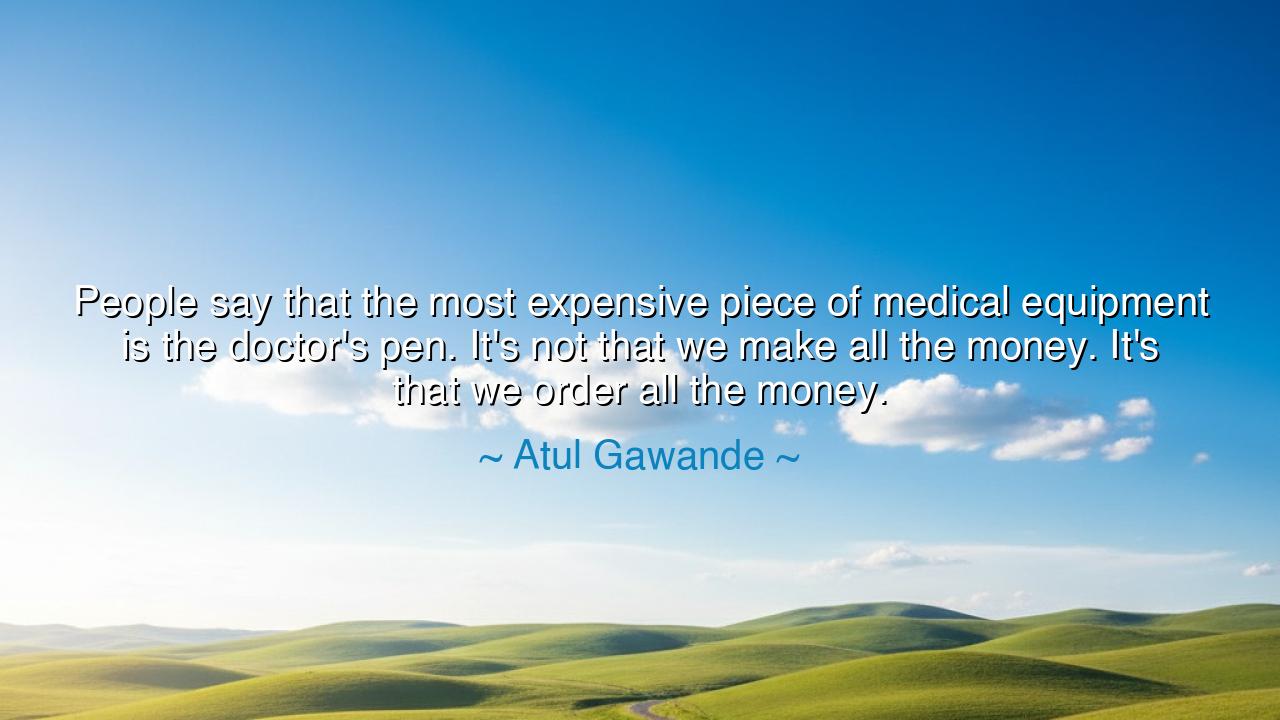
People say that the most expensive piece of medical equipment is
People say that the most expensive piece of medical equipment is the doctor's pen. It's not that we make all the money. It's that we order all the money.






In the grand scheme of life, few forces shape the fate of individuals and societies like the art of healing. The noble calling of the doctor is a revered one, steeped in history and bound by an eternal duty to preserve and restore life. Yet, as Atul Gawande wisely states, "People say that the most expensive piece of medical equipment is the doctor's pen. It's not that we make all the money. It's that we order all the money." These words strike at the very core of a deep and often unspoken truth about the power that lies in the hands of those who hold the authority to prescribe treatment. With a single stroke of the pen, the doctor not only dictates care, but also commands vast sums of resources, setting the course for an entire industry.
In the ancient world, the healers held a place of great reverence. The physician was not merely a servant of the body, but a guardian of the delicate balance between the physical and the spiritual. Hippocrates, regarded as the father of modern medicine, taught that the healer's role was one of wisdom and responsibility. Yet, even in his time, the act of healing was an inherently costly endeavor. The ancients understood that health and medicine were intertwined with the economy of society, and thus, the choices made by healers often had a ripple effect beyond the individual patient. Gawande’s words reveal how the modern doctor, much like his ancient predecessors, holds the power to shape not only the lives of patients, but the very structure of the healthcare system itself.
The metaphor of the doctor's pen as the "most expensive piece of medical equipment" speaks to a profound truth: that medicine is not only a science of the body but an economy of decisions. Each prescription, each test, and each procedure is a choice that sets in motion the flow of money within the healthcare system. Doctors, through their knowledge and expertise, guide the vast machinery of healthcare, directing where resources should be spent. This power, like that of ancient kings who held the fate of nations in their hands, carries both responsibility and the potential for misuse.
Consider the story of Dr. Ignaz Semmelweis, who, in the 19th century, discovered that the spread of infection in hospitals could be prevented if doctors washed their hands between patients. His discovery, though groundbreaking and revolutionary, was met with resistance. The medical community at the time was entrenched in tradition, and the costs of implementing a new system of hygiene were viewed with skepticism. Despite the clear evidence, Semmelweis' ideas were not widely accepted, and his career suffered. The cost of this resistance was not just measured in dollars but in lives—lives that could have been saved had his ideas been adopted sooner. This story reflects the power of the medical community to shape society—not only through treatment, but through decisions that impact the flow of resources and the welfare of the public.
Gawande’s quote urges us to consider the ethical implications of medical decisions. It is not simply that doctors control the flow of money; it is that, in their hands, this power shapes the very structure of society. When healthcare becomes driven by the financial interests of institutions rather than the needs of the patient, we begin to see a disconnect between the healer’s intent and the economic systems that support them. Just as ancient healers were tasked with balancing the well-being of individuals and the resources of society, modern physicians must navigate the delicate balance between care and the economics of healthcare.
The lesson here is one of awareness and responsibility. The doctor’s pen may indeed be one of the most powerful tools in shaping the world of healthcare, but with this power comes a profound duty to act with both wisdom and compassion. Gawande’s insight is a reminder that every decision—no matter how small—can have a lasting impact, not just on the individual patient, but on the healthcare system at large. Doctors must understand that their actions ripple through the economy of care, and their choices can either reinforce or dismantle the structures that uphold the well-being of society.
In our own lives, we must recognize the power we hold, whether it is in our workplace, our families, or our communities. Every decision we make, large or small, has consequences that extend far beyond our immediate sphere. Just as the doctor’s pen shapes the future of healthcare, our words and actions have the potential to influence the lives of others and the systems in which we operate. Let us choose with responsibility and awareness, understanding that the resources we control—whether time, money, or influence—carry the weight of our ethical duty to those we serve. Through such actions, we honor the ancient tradition of wisdom in healing and ensure that our choices serve the greater good.






AAdministratorAdministrator
Welcome, honored guests. Please leave a comment, we will respond soon